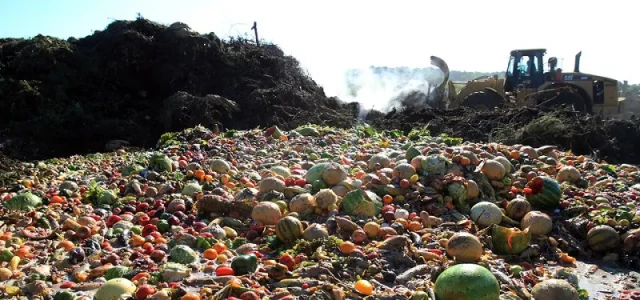Environmental activists have called on African governments to enact laws and policies that protect the environment from methane emission, as the world moves towards zero waste and climate change mitigation.
This was stated at an event organised by GAIA Africa, in collaboration with Community Development Advocacy Foundation (CODAF), Centre for Earth Works (CFEW), Zero Waste Senegal and Andasonia Green, as part of the ongoing African People’s Counter Cop by the Africa Climate Justice Collective (ACJC) holding in Sally, Senegal.
Presenting a document with the theme, 'Zero Waste As A Solution', Coordinator of GAIA Africa, Niven Reddy, stated that waste is the third largest source of methane, primarily from landfilling organic waste, which is over 80 times as potent as CO2.
He also revealed that the fastest and most economical way to reduce emissions from organic waste is to simply stop putting the waste in landfills, by scaling up proven organic waste management strategies.
Reddy stated, ”Many of plastic’s worst impacts, such as greenhouse gas emissions and toxic air emissions, occur primarily in the production phase. If the lifecycle of plastics were a country, it would be the fifth largest greenhouse gas emitter on Earth!
“Other problems, such as the transfer of toxic compounds into food, happen in the use-phase, while non-recyclability of most plastics is an end-of-life issue.”
Sharing reports on a recent survey, Coordinator of Adansonia Green, Farima Tidjani, revealed that 95% of waste in Senegal is made up of plastics, which has become a problem to the environment.
According to her, the only way to mitigate this environmental gap is by implementing organic waste management systems, promoting composting, recycling and producing materials that can be reused.
Tidjani said, “In our efforts to reduce methane emissions, we work in the field of plastic waste management in our communities. We also evaluate waste consumption and we create employment through organic waste.
"Today, we are in reuse because through this we promote recycling and reuse of waste; we ask our communities to kindly move to reuse through household waste management. Through this method, waste pickers are made useful, we have less water pollution, and organic waste can be transformed into chemical fertilisers.”
Also speaking at the event, Desmond Alugnoa, who is also representing GAIA Africa in Senegal, revealed that 200,000 tons of plastic waste are produced yearly in Senegal, while 250 tons of plastics are produced per day in Dakar, which is caused by lack of infrastructure and policies for the management and recovery of plastic waste.
He revealed that the government of Senegal had enacted laws on plastic, which only succeeded in eliminating plastic cups from the environment, but did not remove single use plastic.
He added that these laws were hindered by the rigidity of certain provisions, failure to take into account a commission responsible for managing offences relating to plastic products.
He also said the absence of an explicit provision on the period granted (either six or eight months) to plastics players to comply with the law at the level of transitional provisions, the absence of popularisation throughout the national territory and the absence of implementing regulatory texts were hindering the law.
On her part, CODAF Project Manager Environment, Melody Enyinnaya, stated that Nigeria is one of the African countries battling with policy around waste management.
According to her, there is a false solution around zero waste management laws as it concerns methane reduction, which has hindered actions by environmental enthusiasts and activists.
She opined that the first step to achieving a zero waste economy is by pushing policies that insist on waste segregation from source, and the enactment of real solutions to methane reduction and enforcement of already existing waste management laws.
Some of the demands made at the GAIA side event at the APCC called for policies that put into priority, the wellbeing of waste pickers, laws on segregation of waste from source, policies that put an end to open dumping and littering, and real solutions to methane reduction.
They also demanded that governments must enact laws that insist on extended producers responsibility processes where management of plastic waste will move from consumers to producers, stressing that producers must take full responsibility of the waste they produce.




















